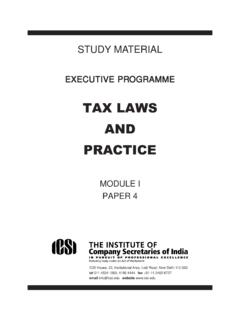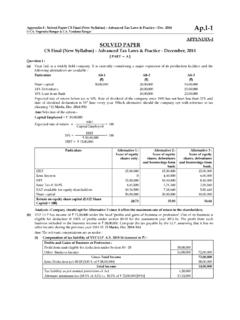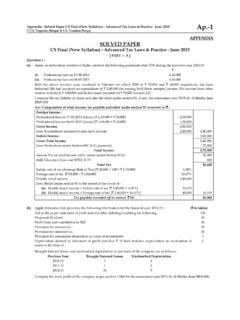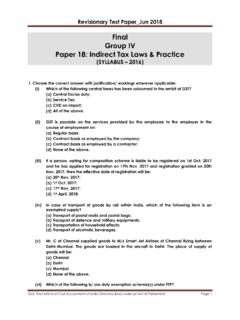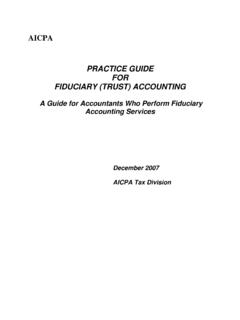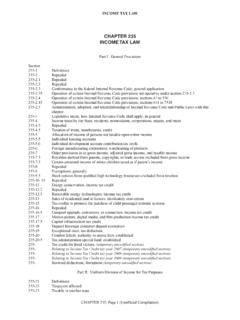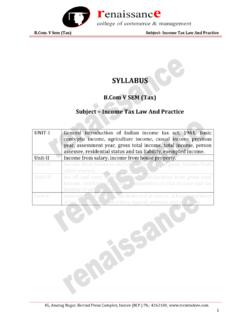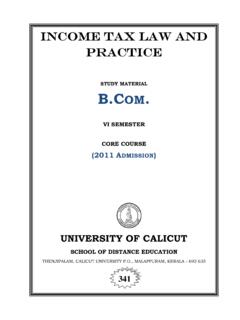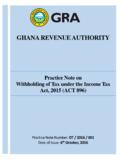Transcription of Principles of Good Tax Administration Practice Note
1 GAP001 Issued: 25 June 1999 Amended: 2 May, 20011 Ptd: 21 September, 2001 Centre for Tax Policy and AdministrationTax guidance seriesGeneral Administrative Principles GAP001 Principles of good Tax AdministrationPrinciples of good Tax Administration Practice NotePrepared by the OECD Committee of Fiscal Affairs Forum on Strategic ManagementCaveatEach Revenue authority faces a varied environment within which they administer their taxation differ in respect of their policy and legislative environment and their administrative practicesand culture. As such, a standard approach to tax Administration may be neither practical nor desirable in aparticular documents forming the OECD Tax guidance series need to be interpreted with this in mind.
2 Careshould always be taken when considering a Country s practices to fully appreciate the complex factorsthat have shaped a particular : 25 June 1999 Amended: 2 May, 20012 Ptd: 21 September, 2001 Principles of good Tax Administration Practice NoteTable Of ContentsIntroduction .. 3 Goals and Challenges of Revenue authorities .. 3 Relations with Taxpayers .. 4 Relations with Employees .. 5 Relations with other Revenue authorities .. 5 Legal characteristics .. 6 Administrative characteristics .. 6 Managing and Adapting to 7 Conclusion .. 7 Guidance Summary Revenue authorities are encouraged to:.. 8 History .. 9 Compatibility .. 9 GAP001 Issued: 25 June 1999 Amended: 2 May, 20013 Ptd: 21 September, 2001 Principles of good Tax Administration Practice paper consolidates the views of the OECD CFA Forum on Strategic Management on the Principles ofgood tax Administration .
3 These views do not necessarily reflect the current policy or direction of individual countriesand are not binding on any country. Rather they represent what may be considered as good characteristics that can bepromoted by international organisations and used as guidance when providing assistance to other and Challenges of Revenue main role of revenue authorities is to ensure compliance with tax laws . Their effectiveness isdependent on a variety of external factors such as the state of the economy, public support for the priorities of thegovernment and the willingness of taxpayers to comply with tax rules. In an ever-changing environment, revenueauthorities must have a clear focus on what their goals are and continually review their operating approaches andprocedures to ensure they are making the most effective and efficient use of the resources available to them.
4 Byadapting and adopting appropriate technologies as well as by being open to the benchmarking and testing of theiroperations to achieve best Practice , good revenue authorities improve both their public image and the organisationof work promotion of voluntary compliance should be a primary concern of revenue authorities. The ways bywhich revenue authorities interact with taxpayers and employees impact on the public perception of the tax systemand the degree of voluntary compliance. Taxpayers who are aware of their rights1 and expect, and in fact receive, afair and efficient treatment are more willing to comply. Skilled and committed employees who are valued and treatedequitably will be more likely to act fairly and professionally in all their dealings with compliance is promoted not only by an awareness of rights and expectations of a fair andefficient treatment but also by clear, simple and user-friendly administrative systems and procedures.
5 Voluntarycompliance is enhanced when it is easier for taxpayers to do compliance is not achieved on a voluntary basis, revenue authorities must identify and address therisks associated with non-compliance by developing strategies targeted at those risks2. Voluntary compliance ismaximised when revenue authorities are aware of major developments and trends in the business and legislativeenvironment, and are responsive to their implications on tax Administration and compliance. good revenueauthorities identify and assess compliance risks and develop strategies targeted at addressing those risks. Thesestrategies include education, service, marketing, profiling risk, auditing, general anti-avoidance efforts, prosecutionand proposals for legislative authorities have to address the opportunities and challenges associated with the globalisation ofthe world's economies.
6 The Administration of tax systems in an open global economy is more complex. Taxpayersare more sensitive to differences in inflation, tax treatment, exchange rates, tax rates and the ability of revenueauthorities to monitor trade and income flows. By increasing significantly the amount and type of income earnedabroad, globalisation also reduces the ability of revenue authorities to verify the accuracy of taxpayers' revenue authorities are strategically focussed and responsive to changes in their environment andthat of their taxpayers. In a globalising context they assess risks to compliance, not only domestically but alsointernationally, with resources allocated on the basis of priorities identified under a sound risk management revenue authorities make good tax treaty partners, as there cannot be significant differences in howtaxation issues are addressed for domestic and international taxation purposes.
7 For example, the availability ofredress mechanisms and the confidentiality of taxpayer information are both domestic and international issues. Intheir dealings with other countries, good revenue authorities co-operate in a spirit of trust and ensure that non-taxdisputes do not impact on the Administration of tax laws . 1 See GAP002 Taxpayer rights and Obligations2 See GAP003 Risk Management and GAP004 Compliance MeasurementGAP001 Issued: 25 June 1999 Amended: 2 May, 20014 Ptd: 21 September, revenue authorities can be characterised by how they relate to taxpayers, their employees and otherrevenue authorities as well as by how they adapt to changes in their business and legislative with major challenge of revenue authorities is to be responsive to the individual circumstances of taxpayerswhile at the same time being translates into accessible, dependable and timely information service as well as theaccurate and timely treatment of requests and appeals.
8 This can be achieved by constructing systems and proceduresthat are aimed more towards the needs of the taxpayers than those of the tax Administration . Examples of this wouldbe to facilitate links with taxpayers through single points of contact to ensure that services are available when andwhere needed. Efforts to develop enhanced electronic means of communication between taxpayers and the revenueauthority which could include enabling the electronic submission of returns, introducing facilities for electronicpayments and on-line access to account good revenue authority consults with taxpayers and other stakeholders on changes to, and thedevelopment of, significant policies and procedures. It ensures that compliance costs are kept at the minimum levelnecessary to achieve good compliance with tax laws .
9 Revenue authorities should also co-operate with otherregulatory bodies in designing appropriate whole of government approaches to lessen compliance costs with dueregard to the interests of all levels of is improved by having policies and procedures that are transparent and that conform todomestic tax laws and international tax treaties and norms. Consistency also implies ensuring that the rights andobligations of taxpayers, complaint procedures, and redress mechanisms are outlined and communicated throughguides, forms, public information and education information should be used only to the extent permitted by law. laws permitting the use ofinformation in the possession of the tax Administration (other than that obtained through a treaty exchange) forpurposes other than administrative should be limited, and the reasons for such exceptions Guidance - Relations with authorities are encouraged apply tax laws in a fair, reliable and transparent manner; outline and communicate to taxpayers their rights and obligations as well as the available complaintprocedures and redress mechanisms; deliver quality information and treat inquiries, requests and appeals from taxpayers inan accurate and timely fashion; an accessible and dependable information service on taxpayers rights and obligations withrespect to the law.
10 That compliance costs are kept at the minimum level necessary to achieve compliance withthe tax laws ; appropriate, give taxpayers opportunities to comment on changes to administrative policiesand procedures; taxpayer information only to the extent permitted by law; and maintain good working relationships with client groups and the wider community. 3 See GAP002 Taxpayer rights and ObligationsGAP001 Issued: 25 June 1999 Amended: 2 May, 20015 Ptd: 21 September, 2001 Relations with and committed employees who are valued and treated equitably are more likely to act fairly andprofessionally in all their dealings with taxpayers. Although salary and benefits paid to employees are not typicallyunder the direct control of revenue authorities, along with opportunities for the development and advancement ofcareers, they can be instrumental in creating an attractive work environment.











